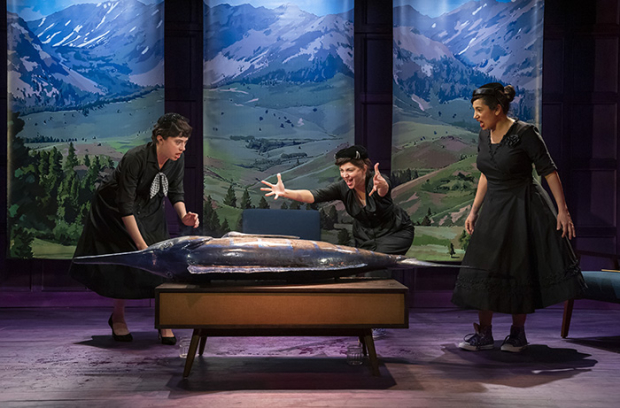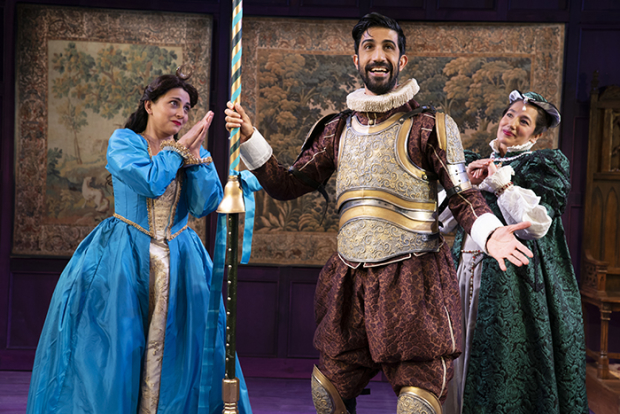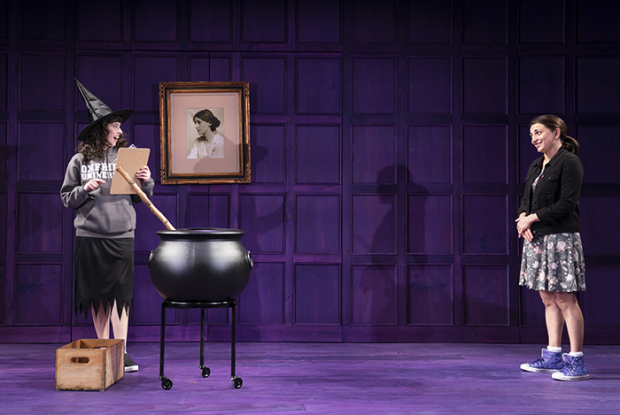The Wives of History Are Breaking Free From Their "Man"-Made Stories

(© Joan Marcus)
Jaclyn Backhaus is on a mission to break things. She makes that very clear in Wives, a play that smashes the patriarchal death grip on history while also trying to shred the very narrative structures that perpetuate it.
Needless to say, it's a lot of work to do in 80 minutes — though much of it is deferred by Backhaus's full admission that she doesn't really know where to begin. She wants to write a new history that frames the wives of "great men" as the true protagonists. She wants to set herself free from a mind that's been molded in unknowable ways by a male-controlled society. And as vivid as her imagination is, she doesn't really conjure a world in which either of those things happen.
Instead, it's her internal struggle as an artist in a world written by men that makes it to the stage of Playwrights Horizons' Peter Jay Sharp Theater. And while it is certainly valuable (and often entertaining) to watch her actors thrash around inside such unsolvable riddles, at a certain point, it's not enough to simply watch characters battle valiantly with the handcuffs that restrain them — no matter what kinds of epiphanies are summoned in the process.
Forward motion of any kind is a challenge for Wives given its fragmented structure. It's essentially three semi-historical vignettes and one mystical appendix, tied together by the theme of women who have been sidelined by history. In the first scene, we meet Queen Catherine de' Medici (Purva Bedi) — wife of King Henri II (Sathya Sridharan) — as well as Henri's mistress Diane (Aadya Bedi) and the royal cook (Adina Verson) who opens the show like a 16th-century Julia Child, demonstrating how to prepare a chicken without poisoning your diners.
History says Henri dies from a jousting wound to the eye, after which Catherine sends her nemesis Diane into exile. Backhaus, however, decides that Henri's dueling "wives" will realize: "Wouldn't it be more interesting if we actually grew to like each other? To help each other? To lift each other up?" That "aha" moment leans a little too far toward precious for my taste, but it does make you ask yourself: Can a story of harmony be more interesting than one of conflict? Maybe not in a man's world where Aristotle sets the rules of drama and history can be boiled down to the events leading up to and following war. But in a woman's world, why the hell not? Cue the Destiny's Child-inspired hip-hop number (Valérie Thérèse Bart's period costumes are irreverently shed to reveal matching purple "Wife" T-shirts).

(© Joan Marcus)
Moments later, all that girl power fades away and we're right back where we started — only this time we're in 1961 Idaho, sitting with three of Ernest Hemingway's former wives immediately following the famous author's funeral (scenic designer Reid Thompson aptly changes the set to match both the time period and comic tone of each scene).
It's the strongest of the vignettes, and the one in which Backhaus and director Margot Bordelon temper their affinity for broad humor with focus, nuance, and some powerful comedic punches. Verson has a particularly entertaining arc as Hemingway's fourth and final wife, Mary Welsh, who timidly mourns her loss until wife no. 1, Hadley Richardson (a perfectly stoic Purva Bedi), and wife no. 3, Martha Gellhorn (a droll and drunk Aadya Bedi), coax her into the realization that she was just another "sidekick to a monument" who wasn't even the genius he was cracked up to be. The scene culminates in a torrent of righteous anger and a ritualistic chant around a giant marlin.
Next, we find ourselves in early 20th-century India where toxic masculinity takes the form of British imperialism — an interesting point muddled by the Wildean tone of a British drawing room comedy. Verson dons a strap-on mustache as Aloysious Patterson, a British official who must ensure that the women in the Maharaja's life are not diminishing his obedience to the crown.
Finally, we land at present-day Oxbridge University in the "Witches of Oxbridge U" club. There are no men this time, just the shadows of their invisible portraits that supposedly cover the walls (the only portrait visible to us is that of Virginia Woolf). Verson plays the eager sophomore founder, while Aadya Bedi plays Swarn, a junior who wanders into the club and is convinced to take part in a spell that will connect her to her ancestor "witches" (Virginia Woolf, Martha Gellhorn, and Catherine de' Medici are listed among those ranks). It's all very silly — until it's not.
Swarn, an aspiring writer, delivers a meditative epilogue about wanting to untether herself from "the visions made by men." It's an elegant speech that comes across as a shoehorned vessel for Backhaus's remaining thoughts. Or perhaps it would be truer to frame it as Backhaus's self-assessment — a list of her aspirations as a writer and the elements keeping her from reaching them. About her characters, she says, "I'll never write the truth of them. I can't even write myself. I don't trust my vision of myself."
There's a hint of apology to those who may have sensed some insincerity in the previous three scenes, but there's also a promise to keep hammering away at the invisible wall that keeps us all trapped in our unconscious routines. Wives may be a play that demonstrates how untidy that process is, but it certainly piqued my curiosity about what's in store when that wall finally falls down.

(© Joan Marcus)











